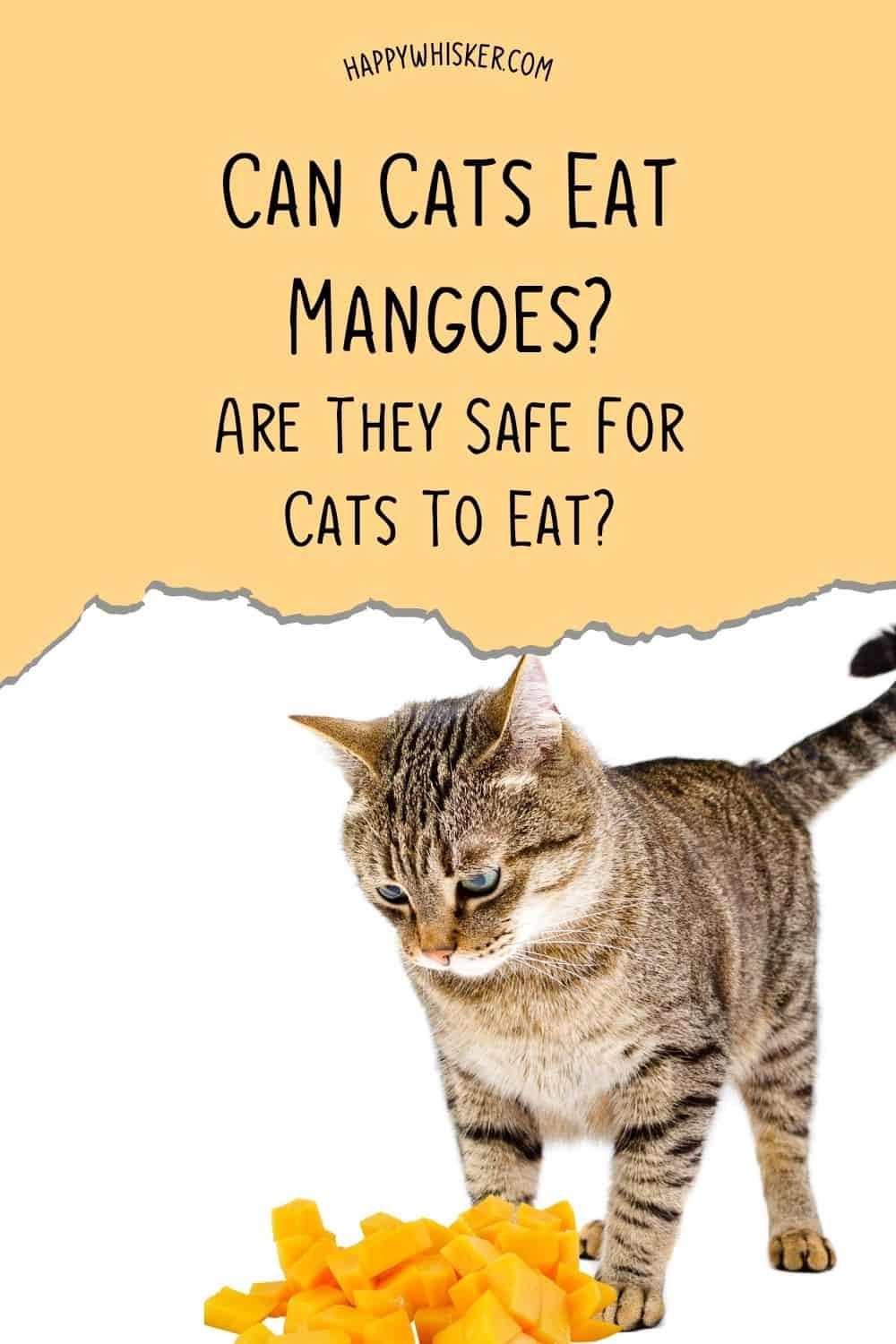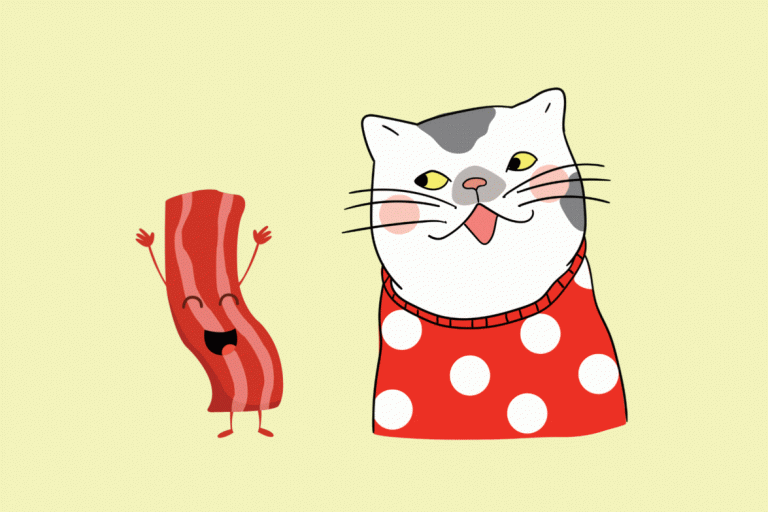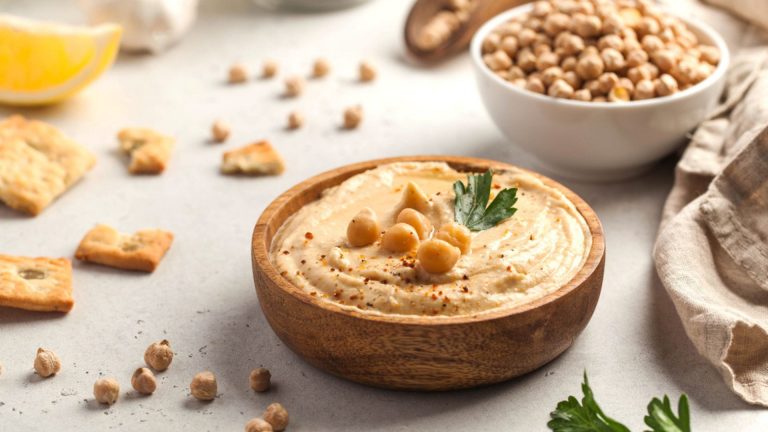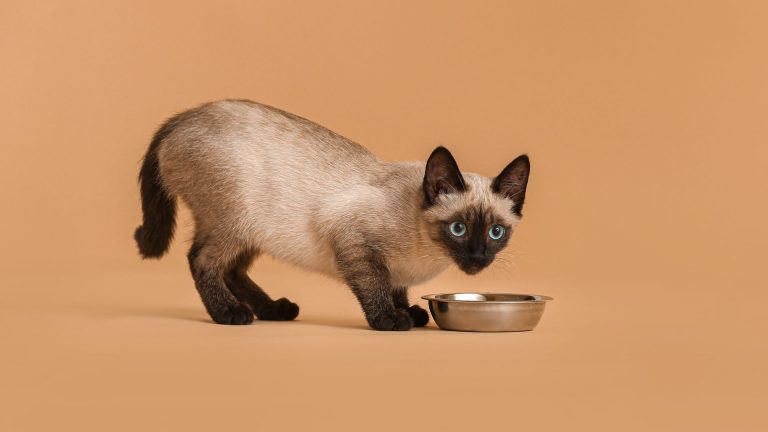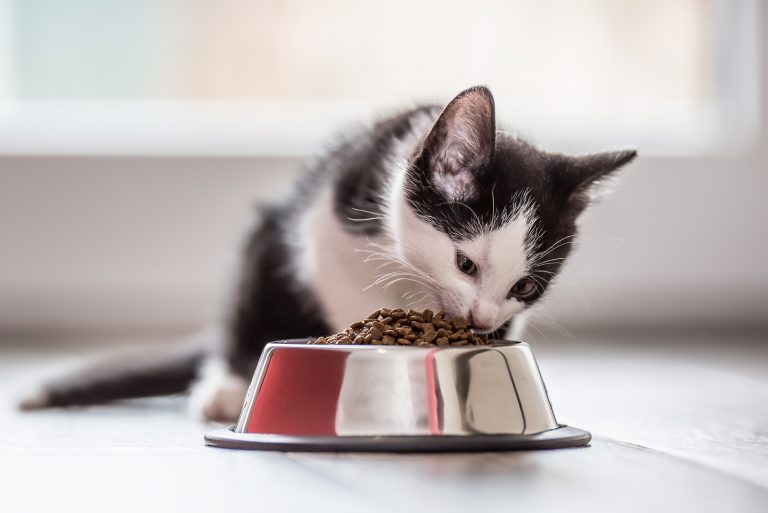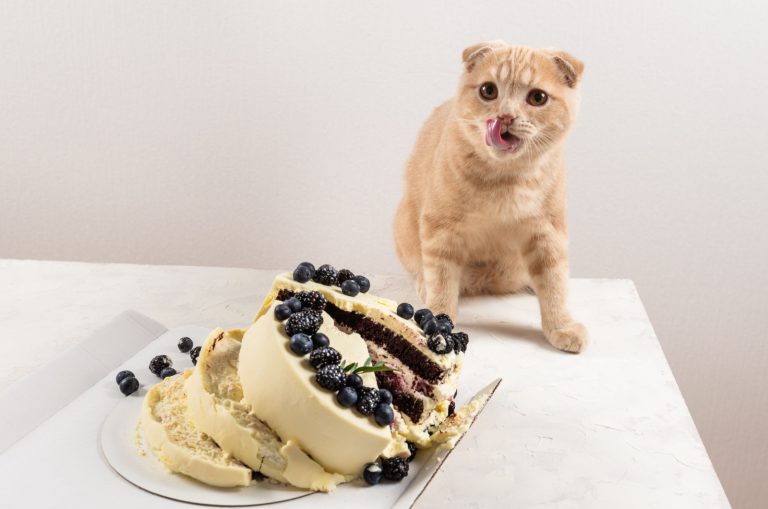Can Cats Eat Mangoes? Are They Safe For Cats To Eat?
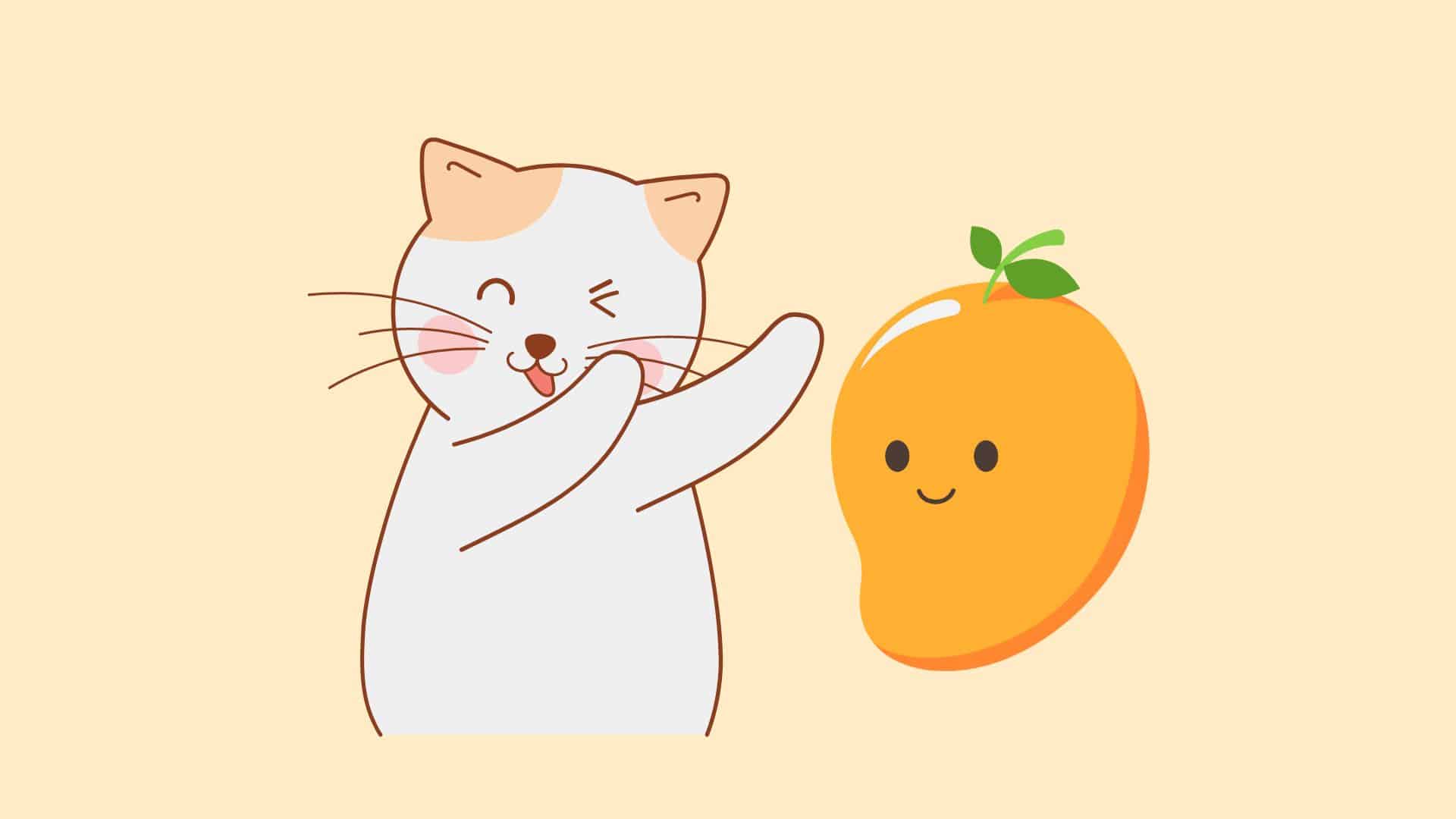
Can cats eat mango; is it ok to give a bite of your favorite fruit to your cat? The quick answer is yes. It is totally safe to include mango in your cat’s diet.
However, cats are only to be given fresh mango and not dried or in the form of syrup. Dried fruit, in general, is not advised for cats since it is usually full of sugar.
Every cat owner wants a healthy cat, and in order to keep it in good health, you must always study new things, especially if something new is connected to food.
We always want to spice up our cat’s daily routine, so let’s learn more about this sweet fruit and how you can feed it to your feline friend. Hope that, while you read, you’ll enjoy the illustrations I’ve made as well.
Can Cats Eat Mango? Can Your Cat Taste The Yumminess?

Yes, in general, it’s perfectly safe for your cat to eat mango. Mangoes are harmless to cats, and it’s healthy and safe for your cat to enjoy a small amount of it as a treat.
Also, mangoes are a good source of vitamin C for humans, but cats can synthesize their own vitamin C, so they don’t get much nutritional value from the fruit. So can your cat eat mango?
Sure it can, but there aren’t many health benefits, and they can’t taste the main thing about it, the sugar, so it’s not like our cats are missing out if they don’t try mangoes.
Overview Of The Sweet Pitted Fruit
Let’s have a quick overview of what one cup of fresh mango (about 160g) contains:
[table id=298 /]
So, mango isn’t toxic to cats and it can safely be given as an occasional treat.
When Is Mango Good For Cats?
1. Moisture
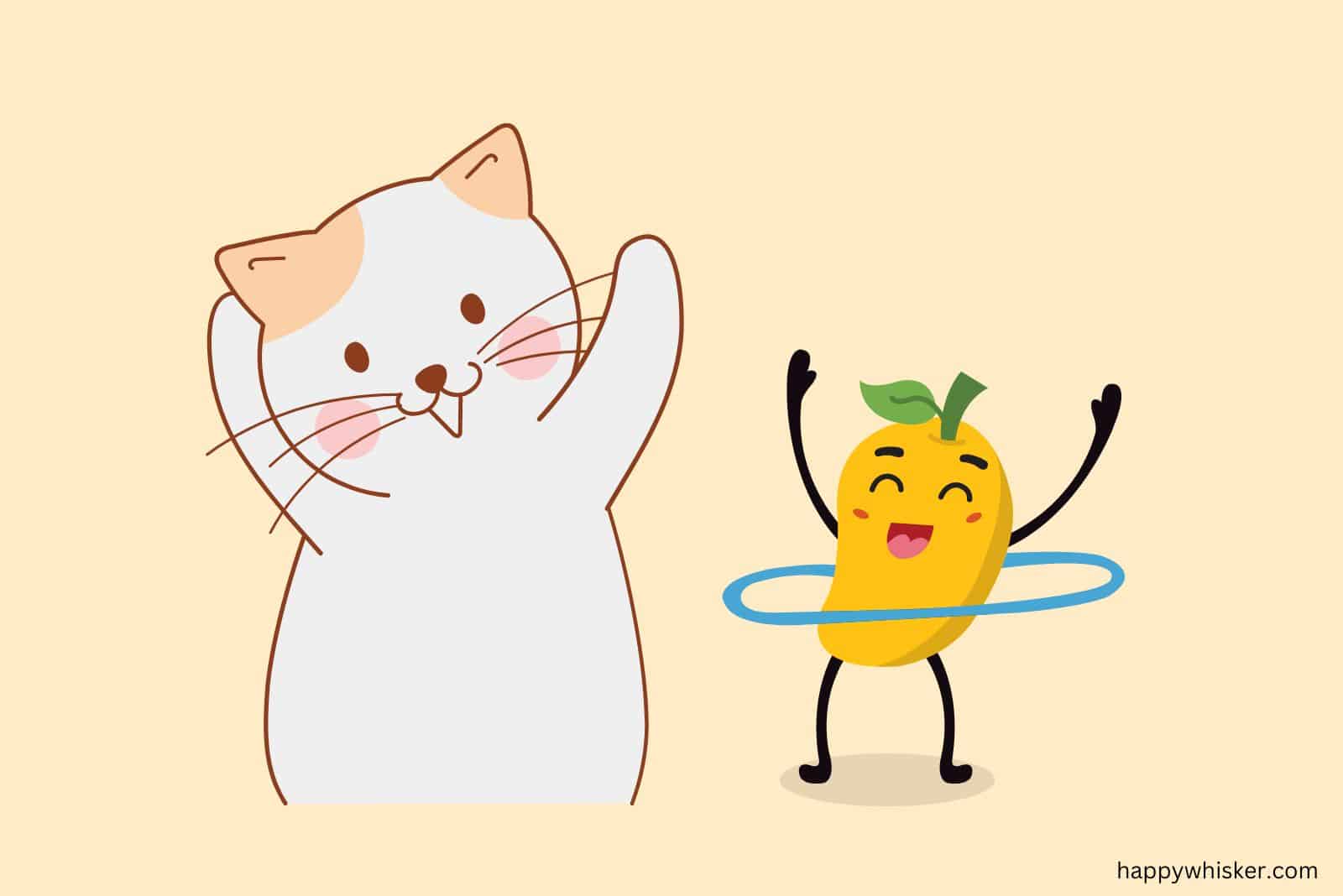
Many cat owners complain that their cats don’t drink enough water, which can lead to skin problems, hair loss, constipation, or poor tolerance to high temperatures.
Cat fountains are recommended for pet hydration because they seem to draw attention, and cats seem to prefer running water to a bowl of water. Mangoes, on the other hand, are an excellent source of hydration for your cat too.
2. Vitamins
Mango is full of vitamins, like vitamins A, B, E, K, and vitamin C. These are all good for your cat, especially for its immune system, as long as you don’t feed it too much mango.
3. Potassium
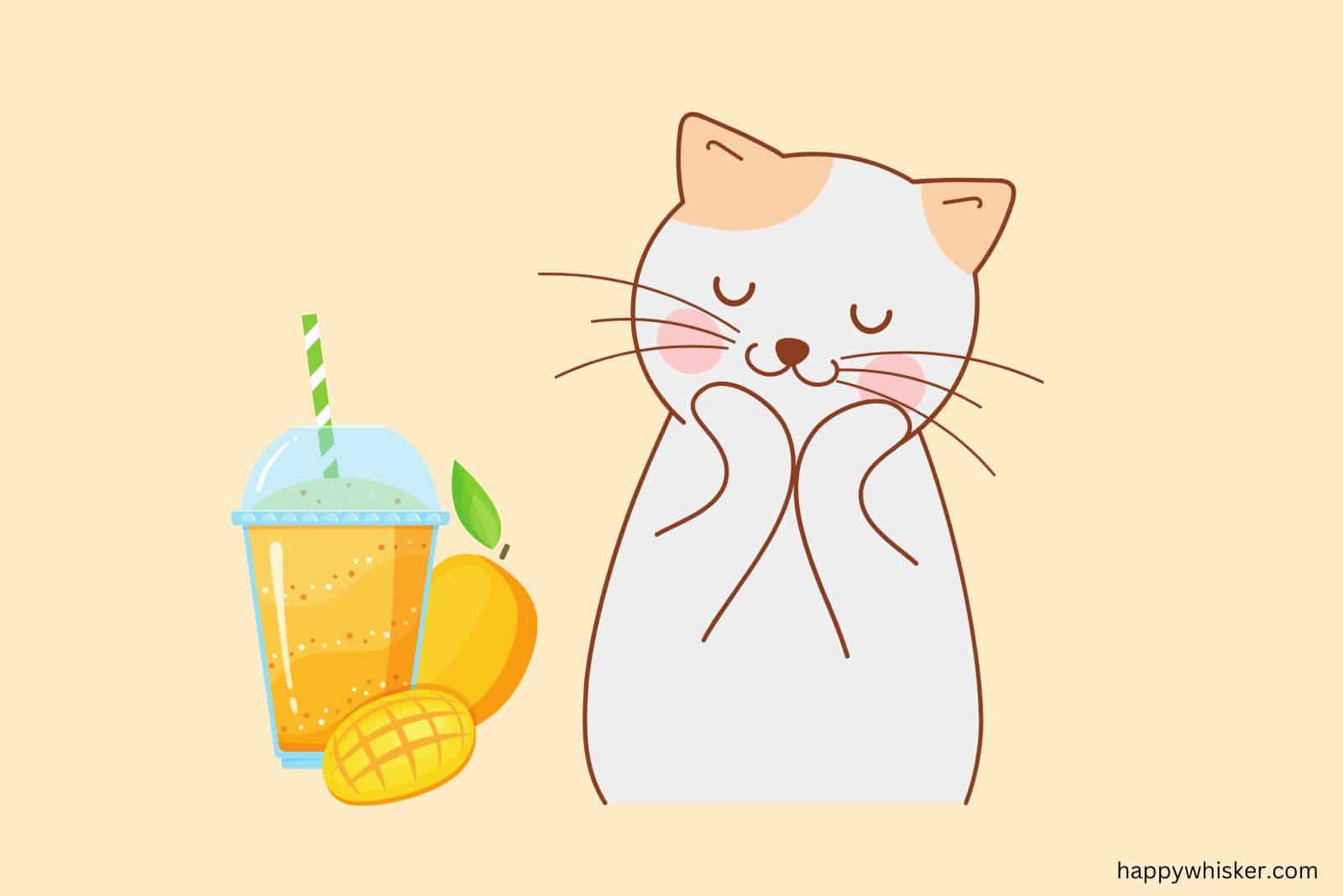
Mangoes are rich in potassium, an important electrolyte for felines. Potassium deficiency can lead to kidney disease, extreme stress and anxiety, heavy urination, metabolic disorders, and other health issues.
4. Healthy Carbs
Mangoes are a great source of carbohydrates, helping cats feel more energetic and alert. They don’t have as many genetic variations as other ingredients typically found in cat foods, and a lot of cats tend to prefer the taste.
When Is Mango Bad For Cats?
Did You Say Mangoes Or Meat?
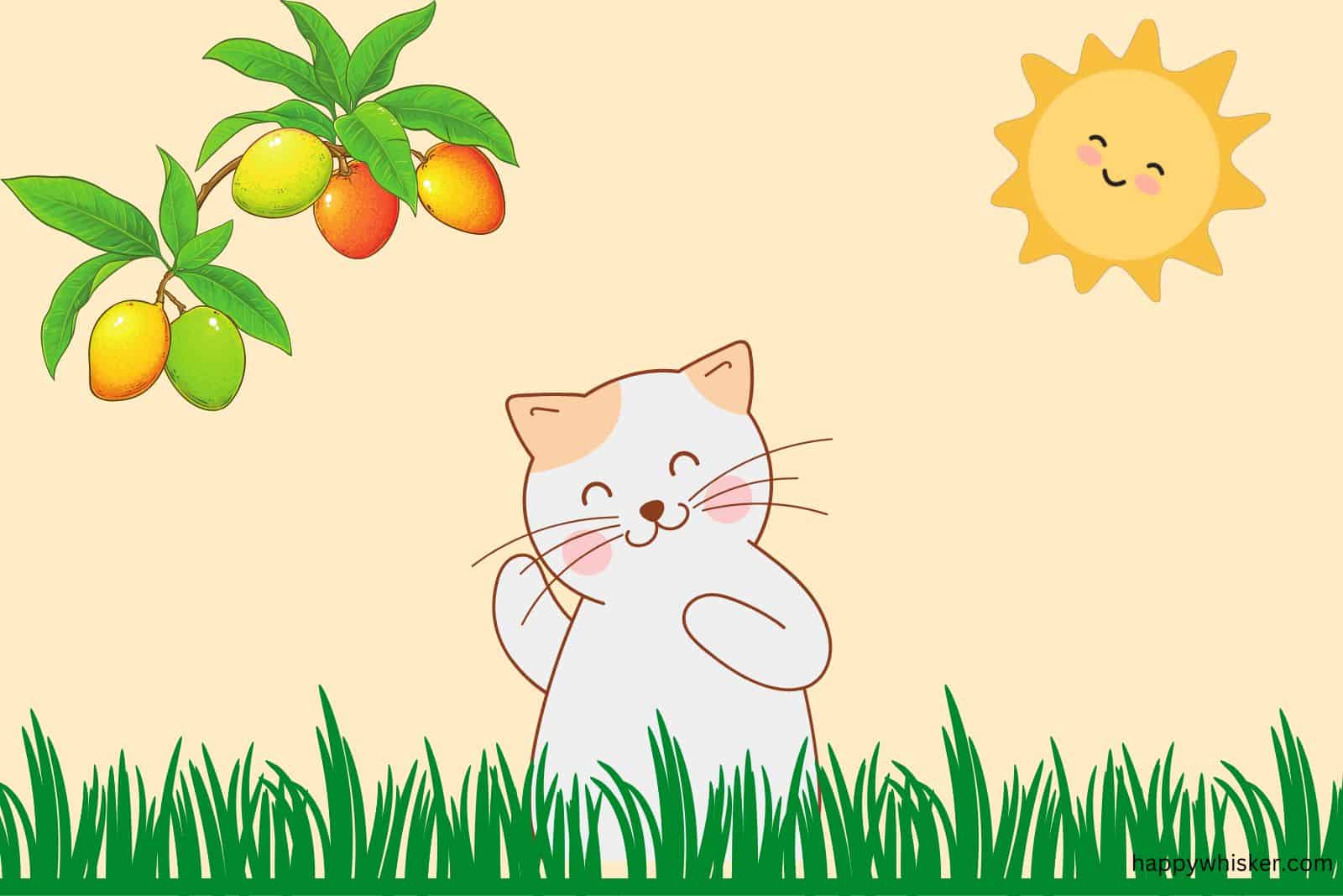
The biggest issue with feeding mangoes and other fruits to cats is that they are obligate carnivores. Cats don’t eat fruit in the wilderness because it is not part of their natural diet.
Instead, they prefer to stick to mice and other rodents, and other small animals that they hunt. Since cats don’t eat mangoes often, it can upset their delicate digestive system and cause discomfort and diarrhea.
Some are more sensitive than others, so cats need to be watched closely the first few times they are introduced to a new food like mango.
High Sugar Concentration
Another problem with fruits such as mangoes is their high sugar content. Too much sugar can easily lead to weight gain and other health problems.
The high sugar content can also quickly lead to tooth decay. Additionally, cats can’t taste the sugar, so there’s no need to feel like your beloved feline friend is missing out on your favorite sweet fruit.
How To Feed Mango To Your Cat
If you and your vet decide it’s okay for your furry friend to enjoy some diced mangoes as a treat, just don’t overdo it. Most likely, a small cube will be sufficient for your cat. So, how are you supposed to give mangoes to your cat?
Wash thoroughly – Mangoes can contain many pesticides, so it’s a good idea to wash them thoroughly before you serve. You can also soak the fruit in warm water for 10-20 minutes and use a vegetable brush to remove the chemicals.
Peel it and remove the seed – Halve the fruit, remove the seed and discard. Be careful, and never let your cat eat the mango peel. Next, slice or blend the fruit so there is no choking hazard whatsoever.
Slice or blend – Slice or puree the remaining fruit until it is about the same consistency as your cat’s regular food. Or cut the mango into small pieces that are easy for your cat to eat.
Always use fresh mango and avoid syrup-soaked fruits and dried mangoes. This is because these products are very high in sugar.
How Much & How Often?
You can feed a small amount of fresh, peeled mango to your cat. A small amount is perfectly safe for cats, so if your kitty grabs a few pieces while you’re not looking, there’s nothing to worry about.
However, mango shouldn’t be given that often, it should only be fed to cats on rare occasions so as not to cause an upset stomach and to avoid excessive weight gain.
You shouldn’t include mango in your cat’s daily diet plan, it is rather an occasional treat for cats that like it. Also, don’t forget that cats cannot taste sugars and sweets, so that won’t be the reason your cat likes mango.
But, despite your cat not being able to taste the sweetness, the sugars can still kick in and quickly lead to dehydration. It is usually recommended that you feed a tablespoon of chopped or blended mango to your cat approximately every three days.
This isn’t likely to contribute to your cat’s weight gain or tooth problems. However, before you include any new foods in your cat’s diet, talk to your vet.
If It’s The First Time, Be Careful
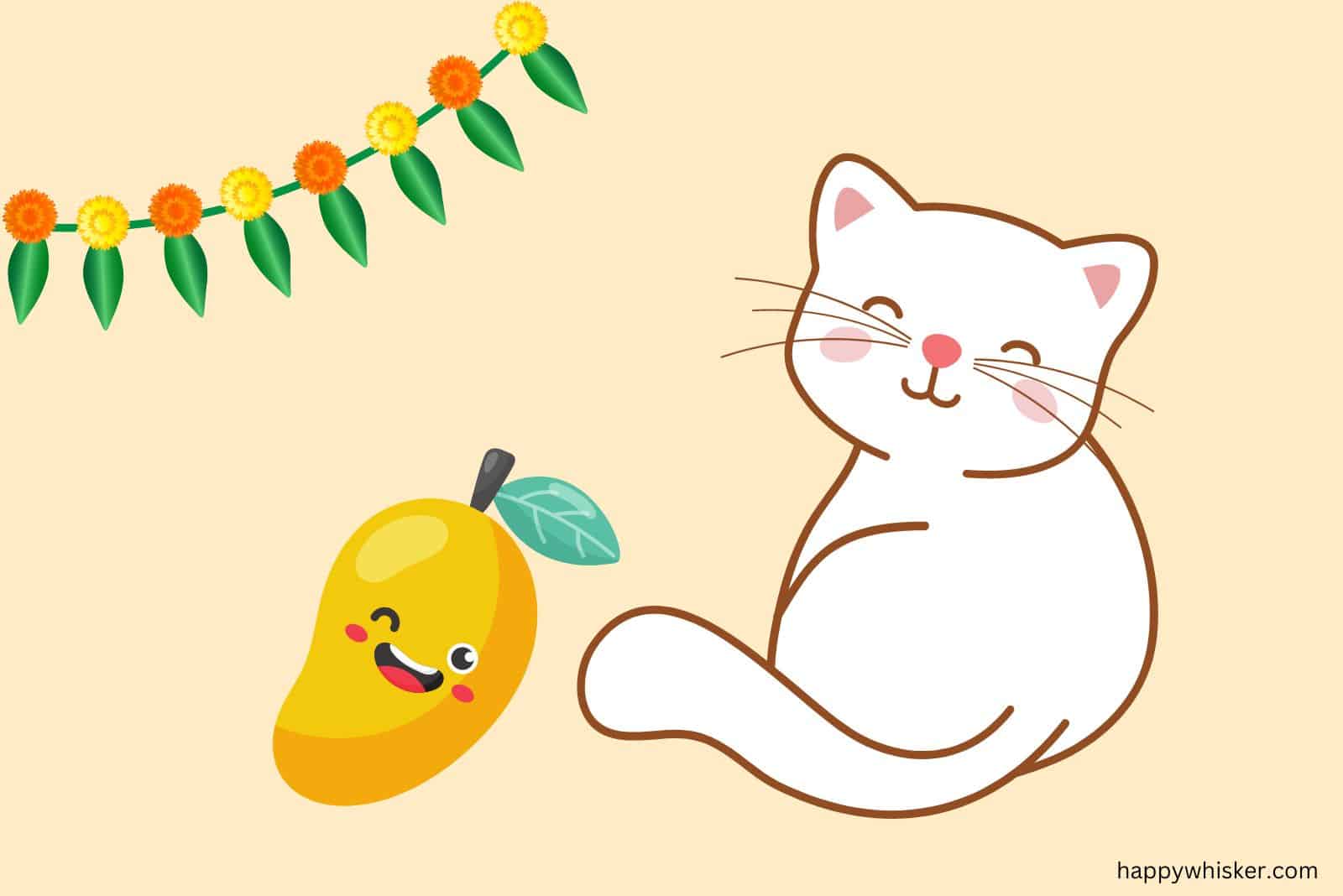
If you’re feeding your cat mango for the first time, you should watch out for the following signs. With permission from the veterinarian, the fruit was peeled, you got rid of the seeds, and cut the mango into pieces. Now let’s see what your cat says.
It’s always desirable to monitor your cat after you give them something new, especially if it’s food. If you notice symptoms such as vomiting or diarrhea, you should seek veterinary help.
Also, keep an eye out for signs of choking so you can intervene quickly if necessary. Remember only to give your cat a small cube of mango from time to time if you decide to do so.
Mangoes are also quite sour, and many cats don’t get excited about them. If your furry friend isn’t interested, we encourage you to try alternative cat treats.
Possible Risks
Mangoes are non-toxic and safe for cats to eat, but there are some risks to consider before sharing them with your cat. Large pieces of seed or skin of mango can pose a choking hazard and cause bowel obstruction.
Mangoes also have a very high sugar content which is why most people like them. But cats can’t eat the same amount of sugar as we can. Too much sugar can cause vomiting or diarrhea in cats or lead to excessive weight gain.
Dried mango usually has added sugars in addition to the natural sugars found in the fruit. It may also contain preservatives, plus it’s hard to chew. Cats find it difficult to chew dried mangoes, so they are a choking hazard, and they probably won’t even like it.
Do Cats Even Like The Taste?
Most cats want a piece of everything their owners eat, and when it comes to mango, your cat might like the texture, but it can’t taste the sweetness that we do.
Now that you know it’s safe to give cat mangoes, let’s check out some other fruits that cats might be interested in.
Some Other Fruits & Veggies Cats Can Eat
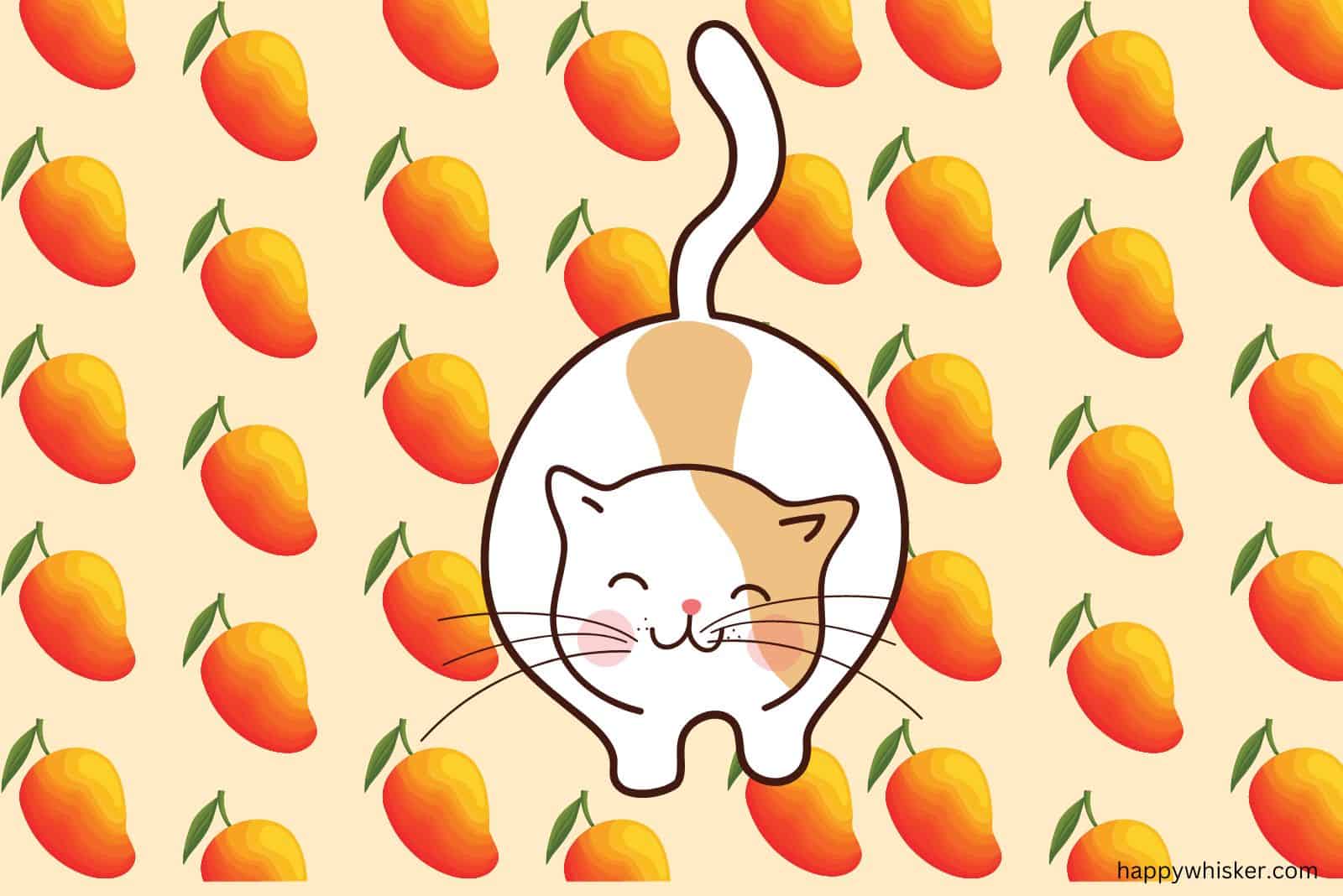
Mango definitely isn’t the only fruit that cats can eat, there are some other human foods that can be even more beneficial. Some are very nutritious, while other human foods can be toxic or contain toxic ingredients for your cat.
Only some human foods are considered safe for cats, and only sometimes! So, always talk to your vet if you’re thinking of adding new food to your cat’s diet, and if your cat suffers from some chronic illness, stick to the diet plan you’ve set up with the vet.
Here’s a list of some human foods that you can add to your cat’s diet, or give them as occasional treats.
1. Pumpkin
2. Lettuce
3. Bell Peppers
4. Blueberries
5. Bananas
6. Celery
7. Spinach
FAQ
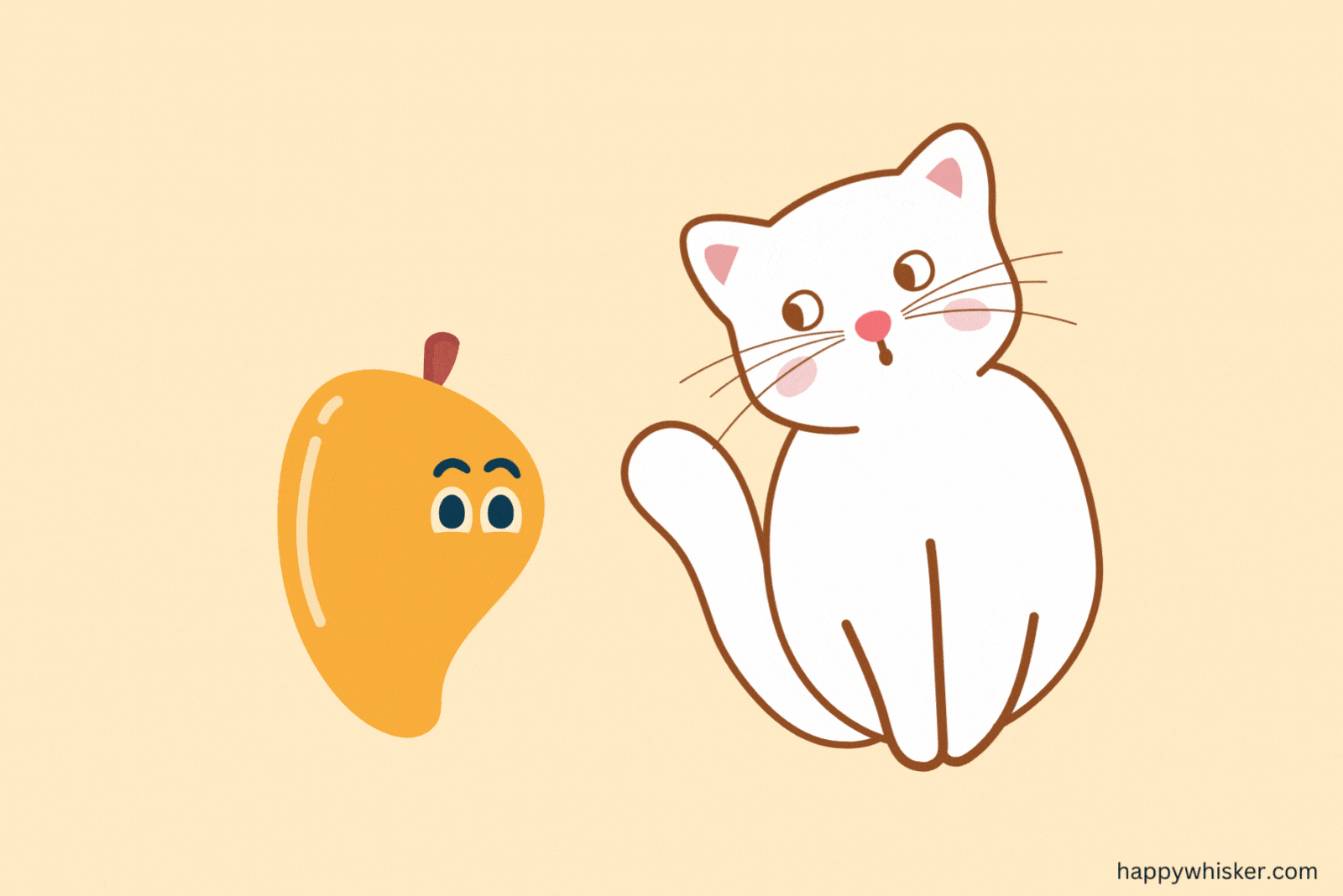
What fruits should cats avoid?
Fruits that are toxic for your cat include citrus fruits like mandarins, oranges, clementines, limes, etc. Cats should also avoid coconuts, grapes, raisins, persimmons, and cherries.
What fruits can cats eat?
Some fruits that you can safely feed to your cat include blueberries, apples, strawberries, bananas, apricots, kiwis, (seedless) watermelon, pears, cranberries, blackberries, and pineapple.
Can cats have green mangoes?
Yes, but it would be better if the mango is ripe since it’s easier to chew. Feed your cat small pieces of blended or sliced mango.
Can cats have mango and pineapple?
Fruits, in general, aren’t that beneficial to cats, but there are some fruits that can be given safely as a yummy treat. Pineapples and mangos can be safely included in your cat’s list of treats.
Final Words On Cats & Mango
Mango is a safe fruit for cats, but it’s not a big deal if you don’t let your cat try it. Your cat’s taste receptors greatly differ from ours, and it can’t taste the sweetness. So these tasty treats can easily be left out of your cat’s daily diet plan.
Remember to always discuss new foods with your vet, especially if your cat suffers from a kidney or heart disease or if it has a special diet plan.
I know most cat owners like to share everything with their cats, especially their favorite fruit. However, some things are better left untasted. And you can always find alternatives to give your cat as yummy treats.
Related Articles:
• Can Cats Eat Dates? Everything You Need To Know
• List Of Best Pumpkin Cat Treats (+ Homemade Recipes)
• How Heavy Should My Cat Be: Weight Guide
Like this post? Share or pin it for later!
